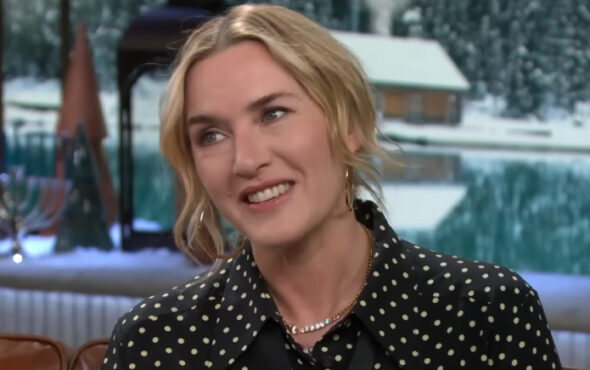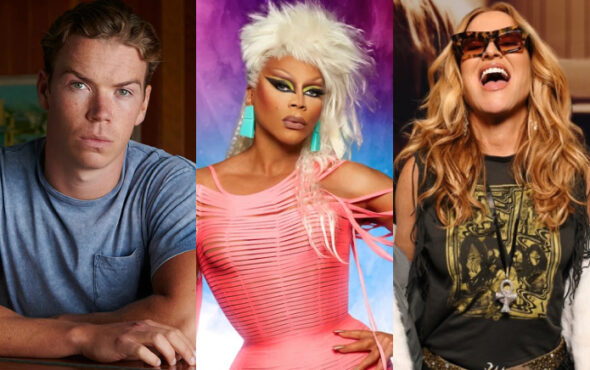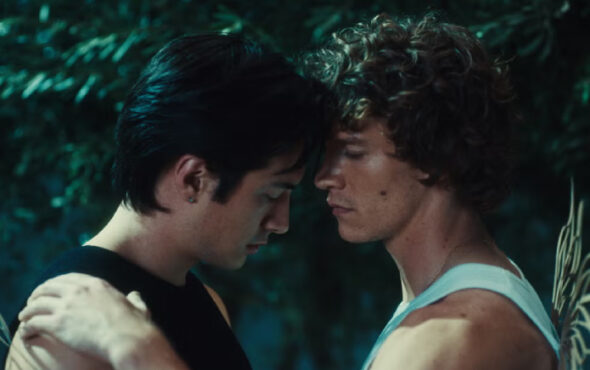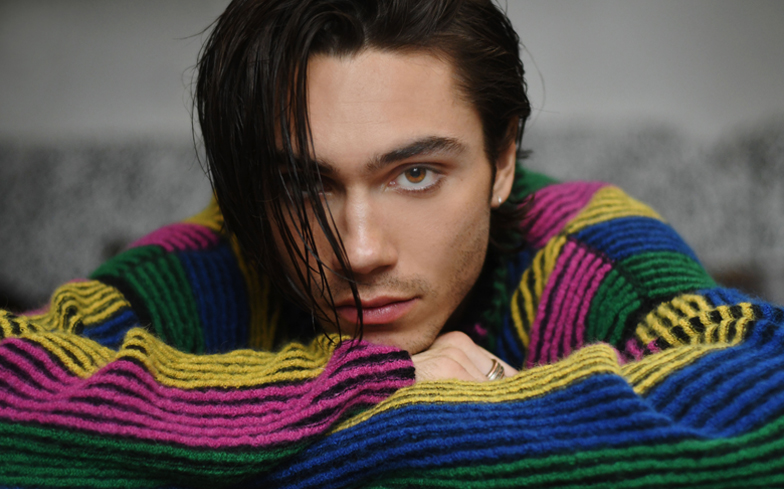
As we climb the stairs to an empty bar at the Duke of York’s Theatre in Central London, we can already hear George Shelley deep in conversation with Sir Ian McKellen.
We’re at the venue as Sir Ian is scheduled to go on stage as King Lear in a few hours, but kindly agreed to interview George for his very first Gay Times cover.
The two sparked up a friendship years prior when the 25-year-old singer-songwriter – still one-quarter of Union J at the time – told the actor confidentially that he’s gay.
Sir Ian has since checked in on the young star, congratulating him when he did come out publicly. Even the night before this conversation took place, Sir Ian called George up in tears after watching his powerful BBC Three documentary Learning to Grieve, which deals with the process he endured after his sister Harriet passed away in 2017.
The pair touch upon how it has changed George’s outlook on life in this insightful and inspiring conversation.
Ian: Now I bet you get asked, ‘When did you first know you were gay?’ And I always say, ‘Well when did you first know that you weren’t?’ But, along those lines, what were the first inclinations you had of being aware that other people were gay?
George: It must have been through television and, honestly, having a computer in the house for the first time. We had a household computer that we’d share, and my brother actually caught me looking up what gay meant. I think someone at school when I was in year six…
I: How old would that be?
G: It was young. Like, 10 or 11. It was when Windows XP was out! I Googled what gay meant and obviously when you Google ‘gay’ quite a few pictures come up. My brother Will was like, ‘What are you doing?’ It was then between us for a long time. I didn’t really know what it was and I didn’t understand it. It took a while.
I: Were you searching because you felt you were gay, or that there was something about you that was different?
G: Yeah, I guess as a kid I was intrigued. Because my dad left when we were younger we didn’t really have a father figure growing up, and the typical standard relationship you imagine your parents having wasn’t in our life.
I: So you’d seen gay characters on television?
G: Yeah, for sure. It would have been in soaps and stuff. It’s just been a part of me. I can’t pinpoint it, because I feel like it has grown with me. It started off as a little seed at that age and then through the years and learning about life and where I want to go and what excites me, I guess…
I: Were there any gay girls or boys at school?
G: I remember there was another boy at school in year six and we had a kiss behind the shed on the lips.
I: Oh lovely! What’s happened to him?
G: I don’t know. I’ve lost contact with him. We used to go to swimming club together, and everyone used to take the mickey. You would get kids being like ‘gay’ and it’s a form of abuse really. They don’t really understand what the word means. But because they’ve heard their parents saying it and they hear it in the media, what gay meant to kids back then, it was a scary word. I think that’s kind of been quashed a little bit now.
I: Did you get any discussion through teachers about the gay world?
G: Nothing. No sex education. Nothing.
I: You know that’s all different now. It’s illegal in this country for a school to discriminate on grounds of sexuality. So any kids saying ‘gay’ in a way to mean ‘useless’ is practically breaking the law, and certainly should be called out by the teachers. There’s been a huge revolution that would’ve helped you and, well, a lot of us actually. So, did you search out any gay movies or books, or was it all just on the internet?
G: It was Titanic probably. We used to watch it as a family as it was our favourite film.
I: What were you looking at in that then?
G: Jack!
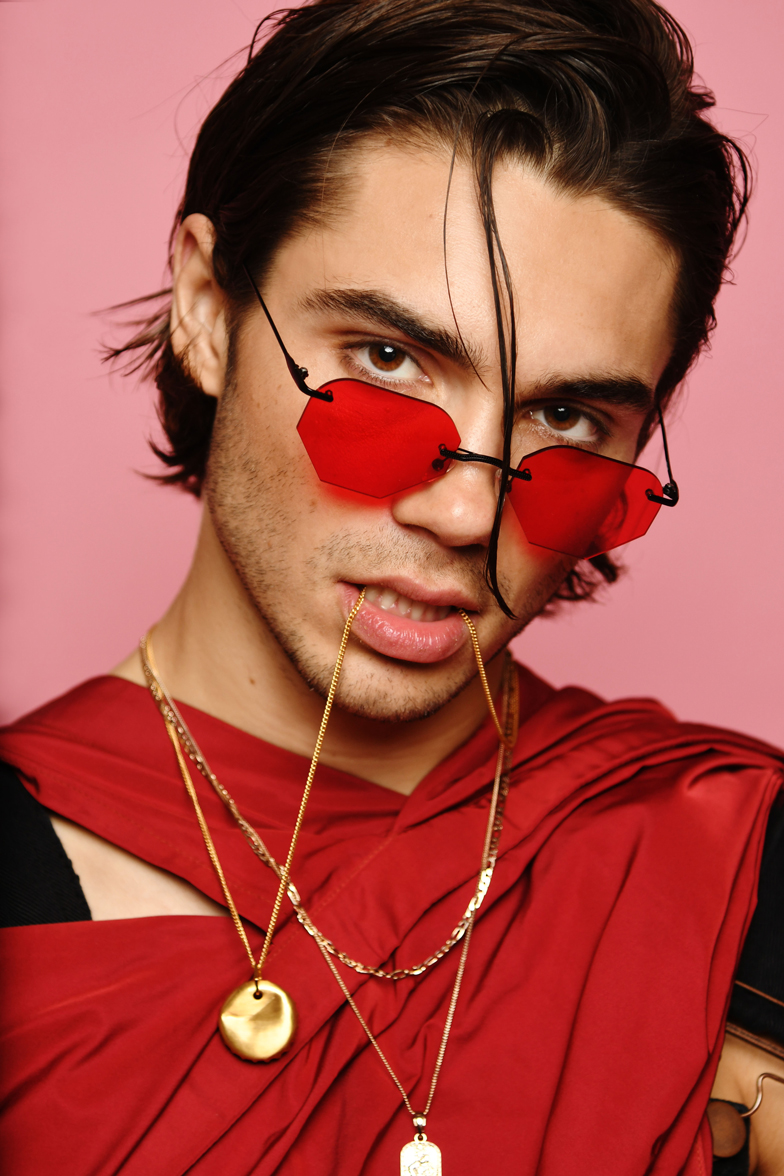
George wears silk windbreaker by Patrick McDowell, dungarees by One Teaspoon, necklace by Alex Orso, sunglasses by Lyndon Leone
I: Now isn’t that interesting. You, a gay boy who perhaps didn’t quite realise it, attracted to a straight actor and it didn’t worry you that he was straight?
G: No, it didn’t faze me at all.
I: The reverse is supposed to be a problem – that if you’re straight you can’t be attracted to a gay character. But there we are. Well, good taste.
G: Good taste! [laughs]
I: So, now you’re 11, 12, 13…
G: I hit puberty really late. I was actually very frigid at school. I didn’t really ever have girlfriends or even pay any interest. I was always physically smaller than all the boys in my class. It wasn’t until I actually went to college that I properly hit puberty. It was a big problem for me, because I didn’t fit in with my peers. Everyone was in these relationships and I was like, ‘Why am I still really small with no underarm hair?’ I got really shy in PE and became really introverted. It just meant that I didn’t excel in those things. What I turned to was art and music.
I: Was there a teacher who was helpful in that regard?
G: All of my art teachers. Every single one of them in all my schools. I moved schools quite a lot because of my mum.
I: Did you fall in love with any of those teachers?
G: Mmhmm, yep.
I: Well you sound like a very normal boy to me! So how could it have been better for you growing up gay in school?
G: Just having a role model I guess. You’ve asked me who I looked up to in terms of media and films, but I can’t really remember there being anyone in particular. Apart from your Freddie Mercurys and George Michaels and the music…
I: But they never said they were gay did they.
G: No, but I always… Seeing Freddie Mercury dancing around in drag with a hoover was mind-blowing for me. I didn’t understand that I was drawn to it at that age, but I was. Through life I’ve gained this massive respect for everybody who did speak out about it. That’s the beauty of time. You learn from people’s mistakes, but also from the decisions they’ve made that were right.
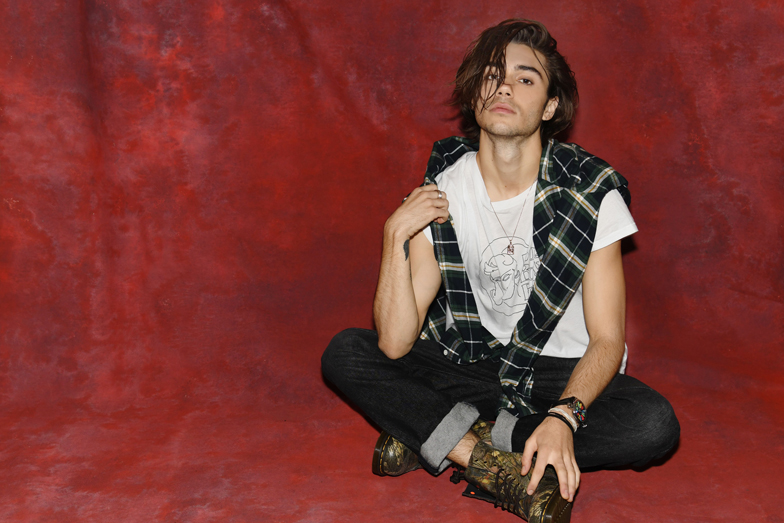
George wears t-shirt by One Teaspoon, shirt and jeans by Levi’s, boots by Dr. Marten’s, watch by GaGa Milano
I: Did you think you’d ought to be talking about it at home? Did you talk about important things?
G: Not really. Home is a small town called Clevedon and the one kid in my year at school who came out, people would put labels on him because he was flamboyant – which is a beautiful thing – but people would judge him for that. He had a nightmare time.
I: What was your reaction to him?
G: I really liked him. He was one of my best friends. Him and another girl were my closest friends at school.
I: Did you stick up for him?
G: He didn’t come out until I left town. So through Facebook I’d learnt that he’d come out and he was always gay. I guess that’s why we were friends, because we shared the same interests and we’d have the same conversations. Even as kids. I could see that he was having a hard time with it when he did decide to come out, and I was terrified of the same thing happening to me. It’s all about having role models, and I can’t pinpoint somebody who normalised it for me.
I: Was it a bother to you?
G:Yeah.
I: Did you tell your brother about it?
G: I didn’t until I came out and then we had a massive laugh about it. He was like, ‘George, I’ve known for ages!’
I: That’s what my step-mother said when I came out. She said, ‘I’ve known that for 39 years!’
G: It was the same with my sister. She was my closest friend.
I: With regards to grief and with regards to this subject, it does seem that British people have a great difficulty talking about themselves personally.
G: It’s because people have this false sense of pride. They want to plume their feathers and stick to these boundaries we’ve put on society. It’s all about conditioning. Unconditional love is going to be what breaks that. The thing with my family is that everyone has always love each other with so much power, strength and compassion. Love has always triumphed in our family. So through all the dark times… We’ve had a lot of big traumatic events take place – not just with my sister, but before that with my dad, and my mum had a stroke – but we’ve always got through that, and no matter what we all love each other.
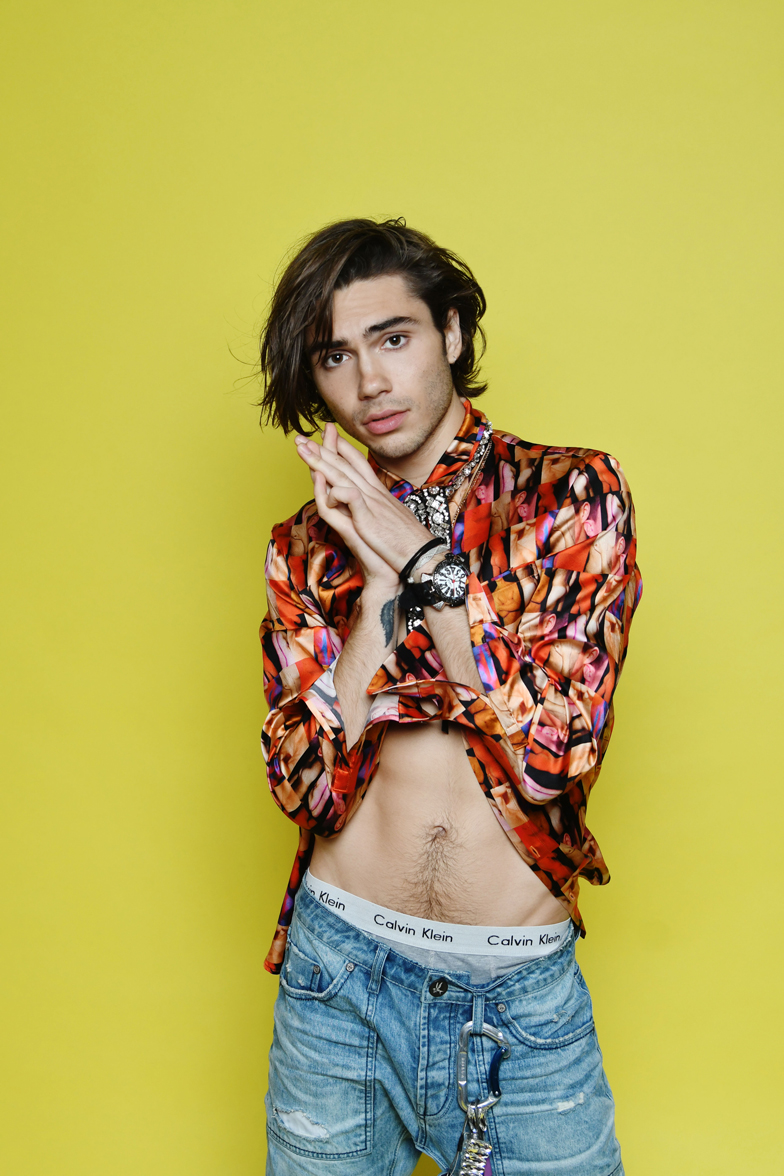
George wears crystal accessories by Patrick McDowell, shirt by Julian Zigerli, jeans by One Teaspoon
I: Are you church goers?
G: No, but my uncle turned to religion after he left his rock band. I think he wanted to start fresh. I went to church with him quite a lot and learned a lot through him.
I: I see, but you weren’t one of those unfortunate boys who is simply told by the church that you were evil?
G: No, not at all.
I: Okay, so you leave school, and then what happened?
G: I left school at 16 and excelled in the arts. That was the only thing I turned to. Everyday after school I would go to my art class with my teacher and just sit and paint. Music and drama were also my subjects that I excelled in. After that I decided to do graphic design at uni, and I even then I didn’t leave home. I decided to go to a uni close by. I never embraced who I was because I didn’t really understand that was part of it.
I: Was there a gay group there?
G: No.
I: There wasn’t a formal gay group you could have joined?
G: Nope.
I: So did you suddenly meet people who were out, there?
G: I met one guy who was out and he was a Mormon. So he was out in college, but not out with his family.
I: That’s a trick and a half.
G: I still don’t understand too much about the religion and that side of life, but I know it was very confusing for him and would’ve been at that time. We just used to talk about home furnishings and Ikea and stuff! We’d take pictures of how we’d colour-coordinate our clothes, and just flirting, but at the same time it was all kept quiet. It was all just on the phone, and we’d see each other at college and pass each other in the halls and have brief eye contact, but we never really spoke in real life.
I: Did you not ever go out partying?
G: Nope, I wasn’t really interested in that. That all started when I moved to London.
I: So there were no gay clubs back home?
G: Nope, just me and my laptop! My computer was the only way I could find out about gay culture – through films and the media. But that’s all a bit twisted.
I: Was it a problem for you?
G: Yeah.
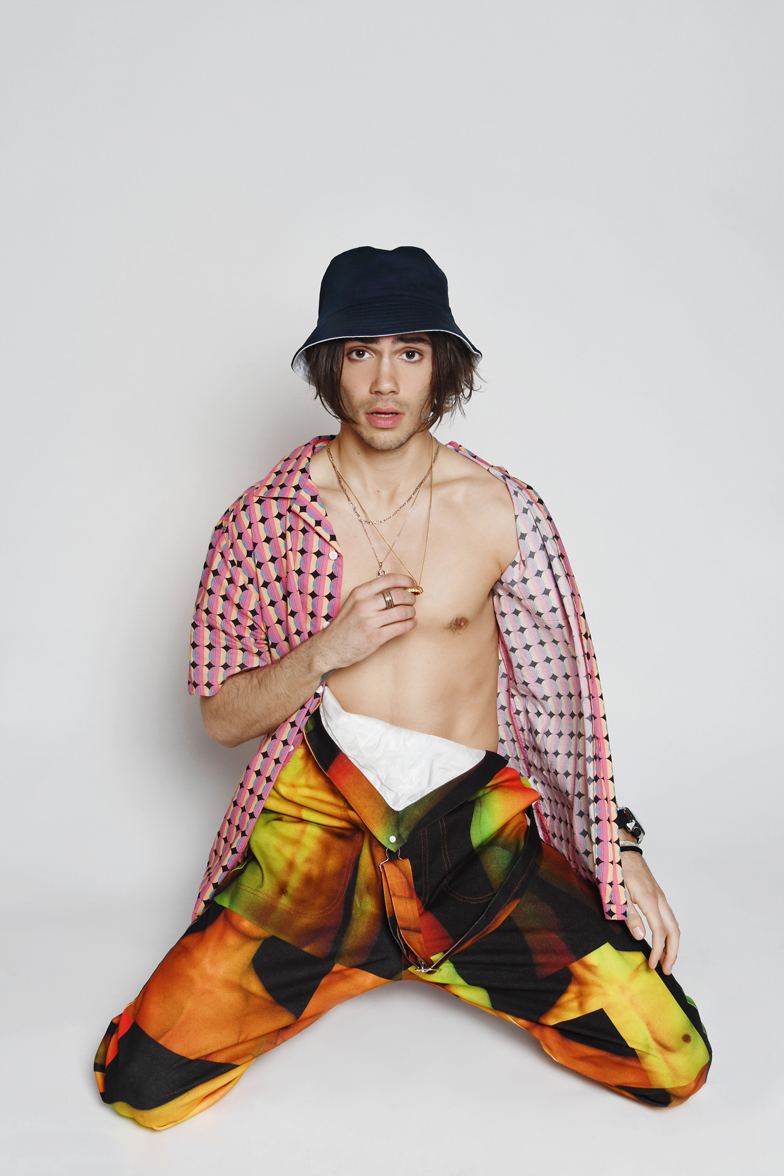
George wears shirt by Onia, dungarees by Julian Zigerli, watch by GaGa Milano
I: It could’ve been a problem that you didn’t think you fitted into society, or it could also be a problem in the sense of ‘Am I gay or am I not?’
G: I was in denial for a long time. Again, these things like acceptance and denial are all a part of grief, but it’s also a part of coming out. Like, accepting who you are as a person.
I: Did you have anyone you met romantically that you called your girlfriend?
G: Yeah, I had girlfriends. I actually lost my virginity to a girl, but when I was 21. And she’s now got a girlfriend! She’s happily in a relationship with the most beautiful girl. We just connected as humans and we loved each other, and we still do. She’s my best friend.
I: Did you see that as an experiment or as a fulfilment?
G: I loved the girl and I still do, and that’s my outlook on life: I love humans. I wouldn’t want to put a stamp on my sexuality. Although my sexual preference is male, I love women. I have females in my life who I will spend the rest of my life with.
I: You’re a perfectly normal person.
G: It doesn’t mean I want to sleep with them, and it doesn’t mean I should be judged because I don’t want to sleep with these people. Luckily these girls in my life share the same outlook.
I: So when you were at uni and you were losing your virginity with girls and fancying boys, did you think ‘Oh this is all lovely – this is what life is for George,’ or did you want something else?
G: There was always an itch that needed scratching.
I: What was this itch?
G: Dick! [laughs] Do you know what, it’s male comfort for me. I love being comforted and protected, and I think it goes back to my childhood of feeling very lost and vulnerable and wanting to hide that side of me. But now as an adult I’m able to see that and fill that void. This is really honest, but it’s true and it’s how I perceive it: I love the comfort of a man. I still find it fascinating to think about how our childhoods can mould us and shape us into who we are. So I lost my virginity to a girl but that wasn’t until after the whole X Factor experience. When I was in the public eye, that was a scary time for me because I was then all of a sudden not only keeping this secret from my family, but from a lot more people.
I: A lot of commentators on being gay would say that you were a victim and that society should have been kinder to you in the sense of teachers at school should’ve been helping you, noticing you were the person you were and seeing if they could bring you out of yourself. Would you say you’re a victim at all? Or do you think, ‘Oh well, I was just growing up and still am…’
G: I think it was all internal. There’s this whole thing of suppressing your emotions and burying them. It’s almost like I pretended I was straight for a long time. I almost wanted to believe because I didn’t want to have to face the thought of judgement and criticism.
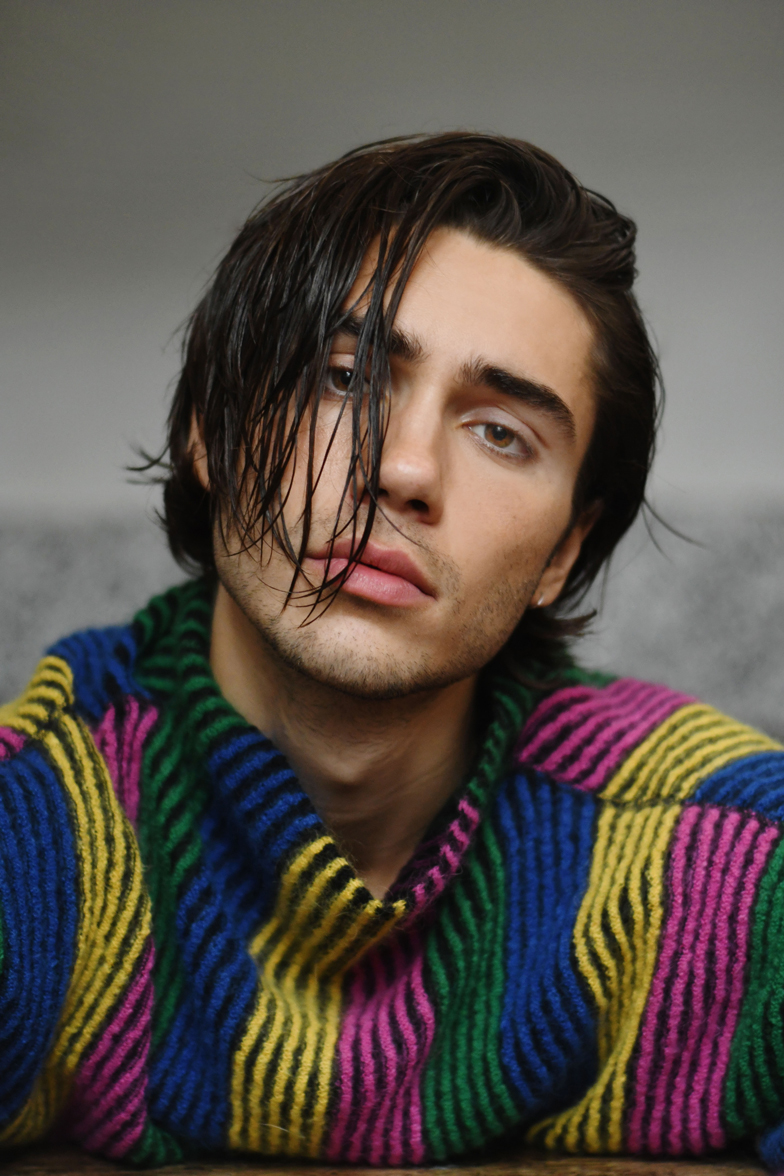
George wears sweater by Julian Zigerli
I: When did you first hear of two men or two women getting married?
G: Not until I moved to London, which would have been 2012. Jaymi – the gay member of Union J who was out – he was my first closest gay friend. I remember having a meeting when I was asked to join the band, people were like, ‘Just to let you know there’s a gay member.’ And I’m like, ‘Why did you just have to let me know? You think that’s going to change my opinion of the band? That it would change my decision?’ If anything, I was like, ‘Cool, let’s go.’ I learned so much from Jaymi. He took me to my first gay bars. I saw him and his boyfriend have this perfect relationship, and they’re still together now. They love each other, and Jaymi told me they wanted to get married, and that opened up a whole new world for me. Then I started going to gay bars and meeting gay guys, and it all just became normal to the point where I’d go back home and I’d start feeling abnormal. I felt like I was more accepted in the big city because there’s more people, more culture, more diversity.
I: When you went back home did you talk to your sister Harriet about it?
G: Harriet was one of the first people I told. Again, she had a similar response to my brother, which was, ‘I know’. Bearing in mind, I did make her skive off school once so we could watch The Bratz Movie. We had it on DVD and I was genuinely ill, but I was like, ‘I’ve got the day off school, Harriet – go tell mum you’re poorly and we’ll watch The Bratz Movie.’ So she did!
I: When you were coming home from London, did you ever want to talk to your mother about it?
G: Um, no.
I: Was it a problem?
G: How do I touch on this? I guess my mum… It’s a difficult subject still. She’s proud of me now. But the first thing she said to me was, ‘What am I going to tell my friends?’
I: Oh god. So she’s like every other mother that ever was? ‘What are the neighbours going to think?’
G: It was a lack of understanding. Once she realised that there’s this whole world out there, all of a sudden she was like, ‘Oh I think it’s pretty cool to have a gay son.’ I was like, ‘See mum. This is what I mean. Come to London for a year and spend a bit of time seeing the world.’ That’s what we need to do: educate kids of what the real world is like, and how much beauty there is understanding who you are and how you can carve your future. But also to share that it’s important to not let your sexuality define your personality and your characteristics. It’s a part of you, it’s not who you are. That’s really important because I think people assume that because you’re gay you should adhere to these rules.
I: Where does your mother live now?
G: She’s still at home just outside of Bristol.
I: Does Bristol have a Pride?
G: It does – I’ve been to it.
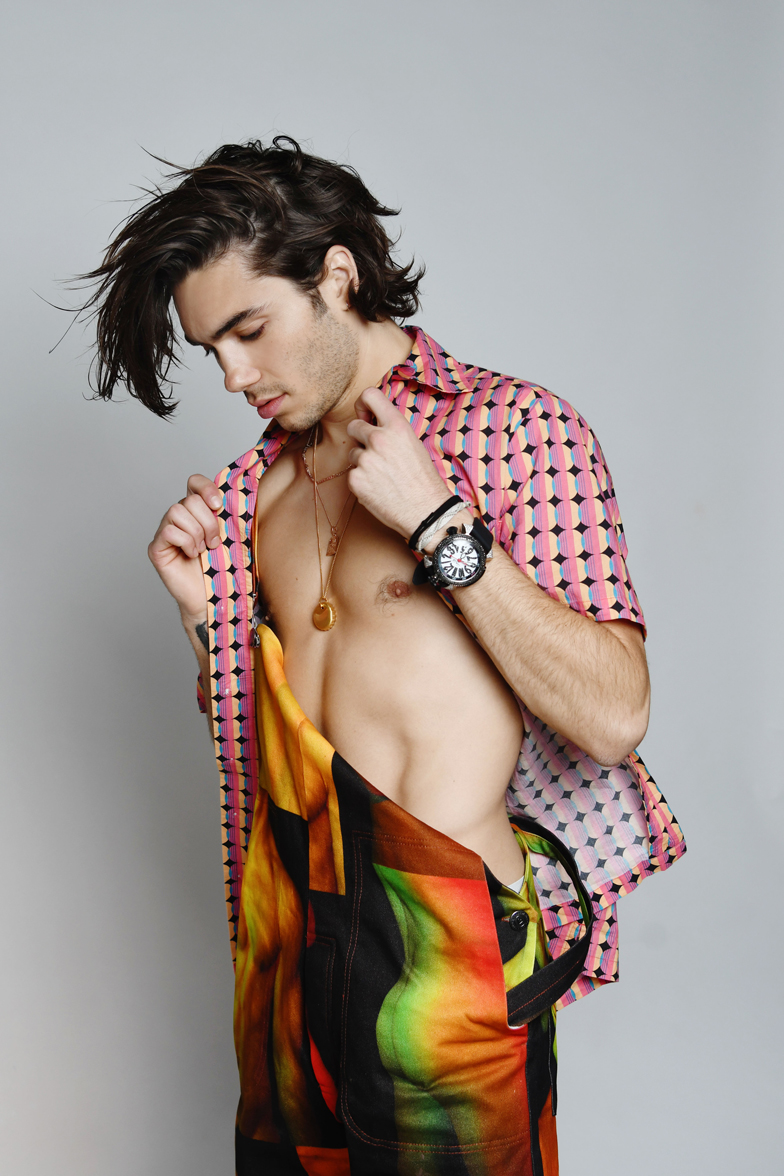
George wears shirt by Onia, dungarees by Julian Zigerli, watch by GaGa Milano
I: Did you take your mother with you?
G: I didn’t, no. She came to Pride in London which is where you met her.
I: Oh yes of course – backstage. That’s right. She was having a ball, wasn’t she.
G: She was. But do you know what? When I said to my mum, ‘Come to Pride,’ she was like, ‘Oh I don’t know if that’s my kind of thing.’ I was like, ‘What do you mean?’ She was like, ‘Well isn’t it just feathers and naked men and water and oil?’ I was like, ‘Mum, no! It’s not just about the parade, it’s about community and having a place where you can feel free, accepted, comfortable, and understood.’ That’s what talking about mental health is all about, because once you understand how you’re feeling and other people understand it, that’s how you get the support. That’s how you’ll move forward. That’s also how, as a civilisation, we’ll start taking steps in the right direction.
I: Let me just ask you this question: People will say, ‘Oh but I knew George Shelley was gay the moment I saw him. And he knows he’s gay. Why doesn’t he just come out – he’s a hypocrite.’ What was your answer to that before you came out?
G: I said in the BBC Three documentary that I was worried about the fact that half of Union J…
I: You were worried, or was it the management that was worried?
G: I was worried, but I think the negative chatter in my head and the things that were convincing me that it was a bad decision were the outside voices manifesting in my head. So yeah, it’s the…
I: Did you talk to Jaymi about it?
G: He knew. It was an unsaid thing. It wasn’t until later on in our career – the back third end of it…
I: So you hid it from the other guys?
G: Yeah.
I: Well that couldn’t have been easy?
G: People knew, and what started happening was I started going out, Jaymi would take me to these clubs, and people would see me with these guys. I’d be kissing these guys on nights out like any other 20-year-old would do when you’re experimenting, and that’s absolutely OK. But because of the situation I was in – the public eye selling records aimed at young girls – I feel like I was made to believe, and made to think, because of the things I was being told and the way I was conditioned, that it would’ve jeopardised the band’s career. And in turn jeopardise my own career.
I: Do you think there’s any truth in that? Don’t young girls like the idea of their idols kissing each other?
G: Yeah, I guess.
I: If you look at those K-Pop bands, they’re overtly sexual with each other and the kids love it.
G: I’ve just never thought of it like that.
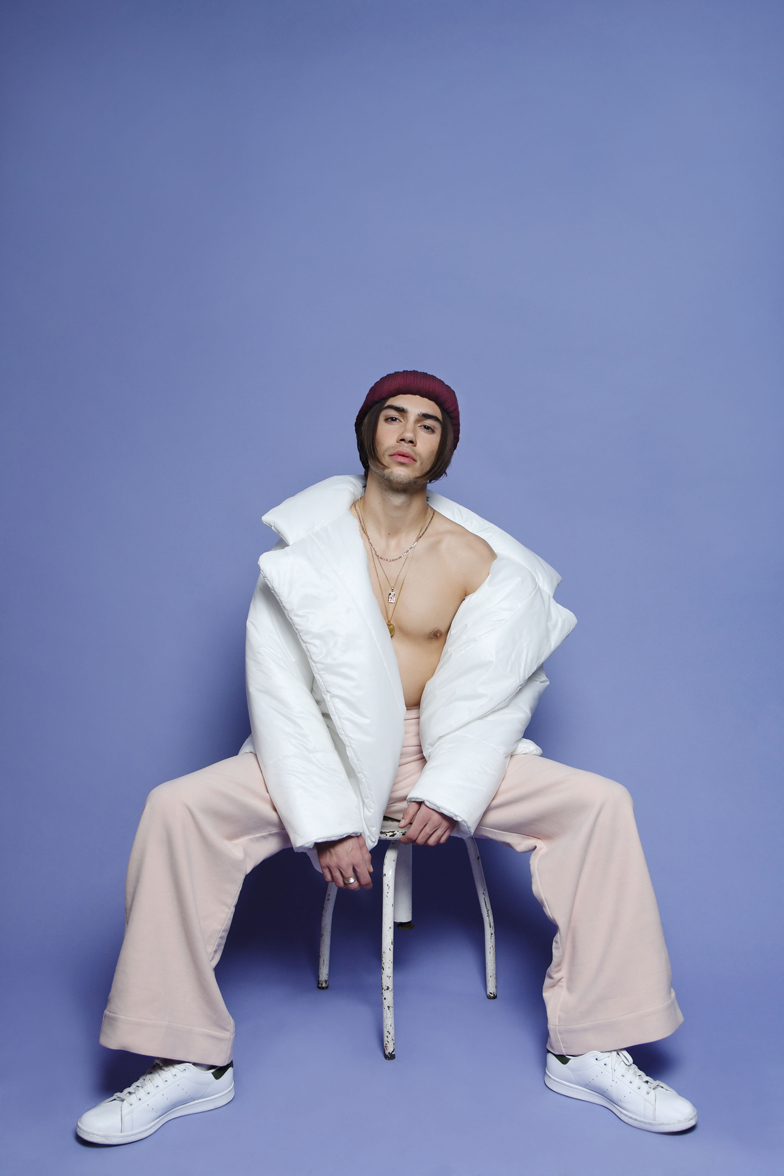
George wears coat by Norma Kamali, trousers by Katharine Hamnett, beanie by Nicce, necklace by Alex Orso
I: Oh yes. They know they’re never going to meet you and marry you. They know that – that’s all fantasy. The reality is they’re responding to a lively, sexual presence. Well, that’s what I think anyway. But there you are on your own trying to puzzle your way through, but do think if you’d not been in the band you would have been able to come out earlier?
G: That’s so interesting, because if I had not been in the band I would never have moved to London and I’d still be in Clevedon in this bubble of what it means to be gay. I wouldn’t have been educated on it. Moving to London I learned a lot by meeting people and sharing life experiences. I don’t know if I’d even know within myself, and that’s scary.
I: I think you’d have found your tribe eventually.
G: I guess. You shall come out!
I: Is there anybody in the world that you still mind knowing that you’re gay?
G: Oooh.
I: I only ask you this because even I… I was in a cab the other day and the cabbie said, ‘Have you got any grandchildren Ian?’ I was like, ‘Oh fuck, it’s 3am – do I have to start explaining to him that I’m gay and that it wasn’t possible for me to be a father?’
G: Would you have chosen to be a father?
I: No, I thought it was one of the best things about being gay is that you didn’t have to have children. Or go in the army! So anyway, at 3am I was like, ‘Okay, I’m going to out myself to the taxi driver.’ So I went, ‘no, I’m gay’ and he went, ‘Yeah, so am I!’ But I just wondered if there’s any part of you that isn’t entirely out?
G: No, I would tell everyone.
I: Well congratulations, because that means you are through and out the other side. What’s happened to the closet door? Have you burnt it?
G: Definitely! I don’t know what happened, but to be honest I think part of it, losing my sister was the most awful thing that has ever happened to me and it really put into perspective how short life is, and how much you have to embrace who you are as a person. You have to embrace what makes you, you. I’d hate to have any regrets in the future, and to look back and be like, why didn’t you just enjoy it while it was there? My sister was all about being who she was. She was very passionate about what she did, and she knew exactly who she was and what she wanted in life. I guess I’ve taken that and applied it to my own life. I don’t want to waste one day. I don’t want to lie and pretend I’m somebody I’m not.
I: That’s fantastic. Let’s just ask this: don’t go into all the pain of losing your sister because that’s on record in what is, quite frankly, a beautiful documentary. But do you now feel that part of what George has to do is to help other people through situations that you’ve managed to deal with?
G: I just want to share my experience…
I: Because that makes you feel better or because it actually helps somebody else?
G: I just hate to think that there are kids out there feeling what I felt – that confusion. When you’re suppressing your emotions like this, you bury and bury and bury and you don’t work through. The best way to move forward with this is to talk about stuff. I just hate to think that there’s someone in a small seaside town somewhere and all they’ve got is their computer to talk to. That’s where I was. It was just me and my friend, the laptop who I told everything to. That search history knew more about me than my friends and family. I just want to open my arms up and be like, ‘It’s okay to be you, and it’s okay to be proud. Life is there to embrace.’
I: What do you think about gay people who have access to the media like you, who don’t take advantage of it in that way?
G: It’s really important that we have role models for kids to look up to.
I: So you think that because people have chosen a career where they are in the public eye, they have a duty?
G: Totally. If you want to – if it’s something you feel passionate about. It comes down to the person and how they approach life. Like I said, I’ve got five little brothers and I wouldn’t want them to go through anything that I’ve been through, and that’s just been suppressing and suppressing and hiding. It’s being paranoid and scared and it all develops later in life.
I: Is there anything else that you’d like to say?
G: Just, thank you.
I: You are so articulate.
G: Really? I said ‘dick’ though. Sorry for saying ‘dick’!
I: Well that’s quite articulate!
Photography Jack Alexander
Interviewed by Sir Ian McKellen
Fashion Darkwah Kyei-Darkwah
Videographer Tommy Bruce
Grooming Tyron Sweeney
As told to Lewis Corner

